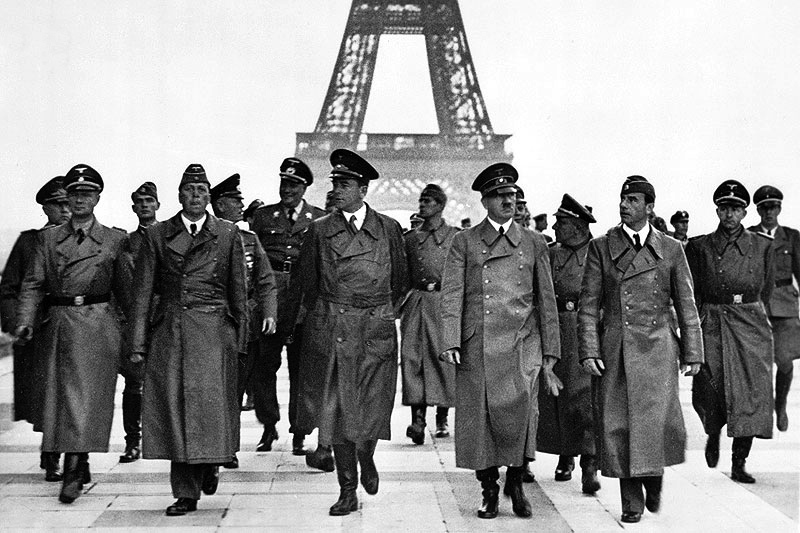
Yes. In fact, in the 1939-40 war against the original allies of France, Poland and Great Britain, Germany did win.
Today, we see these victories as inevitabilities. To the world in 1940, they were nothing short of unimaginable. These victories are not just tactical:
-Poland ceases to exist;
-France’s Third Republic is replaced by the Nazi collaborationist Vichy government;
-Great Britain’s forces are pushed off the continent, barely clinging to survival.
By the summer of 1940, Hitler’s stage-by-stage plan (‘Stufenplan’) as dreamed in the 1920’s is coming to fruition:]\
– Austria, Bohemia and Poland are now part of Greater Germany.
– France and the Treaty of Versailles are neutralized.
– The British, Hitler believes, are finished and will soon negotiate.
But the British don’t act as he thinks they should. They don’t negotiate after Dunkirk. While many of Great Britain’s leaders seek a negotiated agreement–actually, almost all of them— Prime Minister Churchill fights on.*
So, it is within this environment in Summer 1940 that Hitler orders the invasion of the Soviet Union. Hitler orders plans for a lightning quick assault, much like the invasions of France and Poland. Besides, according to Hitler: “you only have to knock down the door [to the Soviet Union] and the whole rotten edifice will come crashing down.”
Hitler long had dreams of colonizing Eastern Europe and providing living space for the German people. But there are greater geopolitical considerations contributing to his decision:
1 – Hitler hopes the USSR’s defeat will force Britain to the negotiating table.
2 – Hitler’s fear (as expressed in his Zweites Buch) is the threat posed by the ‘American Union’. In multiple table talks, Hitler alludes to the potential danger of a US-UK-USSR coalition. He knows Germany will lose such a fight (even though he fails to realize America’s industrial ability.)
By speedily defeating the USSR in a surprise attack, Hitler hopes he can negotiate with Britain then rally his new Europe for the long-term battle against America (the final step of his unwritten ‘Stufenplan’). He may consider the “Judeo-Bolshevik” Soviet Union his most pressing enemy, but he considers America to be Germany’s greatest long-term threat.
But Hitler’s plans are botched because:
1. Hitler wastes time saving Mussolini’s failed campaigns in North Africa and South Europe. Instead of Spring 1941, Barbarossa is launched in late June. Precious time and resources are wasted in what amount to distractions.
2. Hitler fails to consult the Japanese on the invasion of Russia. The million-man, highly regarded Kwantung Army does nothing in support of Operation Barbarossa. Hitler fails to consult the Japanese, even though Japan has a long history of territorial ambitions in Siberia; even though Japan needs natural resources which Siberia has in abundance; and even though Hitler later declares war on the United States in hope that Japan will return the favor by attacking Russia.
3. Hitler never solidifies Operation Barbarossa’s strategy for success. Originally, Barbarossa’s central plan is defeating the Red Army. Then, it is the capture of Leningrad. Then, the capture of Moscow. Constantly Hitler’s personal interference foils the Wehrmacht’s operational abilities. Without a real strategy, the military wastes precious time transferring units from one front to another based solely on Hitler’s personal anxiety.
And in 1943, FDR, Churchill and Stalin meet in Tehran. Stalin toasts the occasion: “To American production, without which this war would have been lost”.

Theodore Lee is the editor of Caveman Circus. He strives for self-improvement in all areas of his life, except his candy consumption, where he remains a champion gummy worm enthusiast. When not writing about mindfulness or living in integrity, you can find him hiding giant bags of sour patch kids under the bed.
